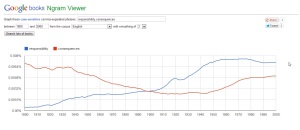
Outliers: The story of success
There are those who like to believe that the successful among us raised themselves up from nothing, that they overcame victimhood and adversity to succeed against all odds, that there is such a thing as a “self-made man” who did it all on his own. In this clear and approachable book, Gladwell demonstrates through a series of connected anecdotes and evidence that this just is not true.
Success depends on opportunities outside our control, such as who our parents (and their parents, and their parents) are, where we happened to be born, when we happened to be born, what happens to be going on in the world around us at the time, and most importantly, a convenient convergence of all of these things. Then, with all of that in place, you have to know how to recognize and seize the opportunities in front of you, and knowing how to do those two things is a product not of singular individual genius and work, but of upbringing and environment.
What the classic American narrative of success lacks is the uncontrollable and often convenient circumstances that play just as much, if not more of, a role in success than our own personal merit. Those who achieve great success are often brilliant of their own accord, but Gladwell urges us not to forget that genius without environment goes nowhere (and offers the story of Chris Langan, a certifiable genius whose life has essentially gone nowhere as a result of a dearth of opportunity, as evidence that brilliance alone does not predict success). There are plenty of talented, brilliant people who do not go on to great success, and they are not failures, are not necessarily lazy, or any other negative thing, but they simply missed the boat they had no control over.
This is where the idea of 10,000 hours to perfection was popularized. Bill Gates and The Beatles were all very talented and successful, mostly because they combined talent with ambition. But what good are all the ambition and talent in the world without opportunity? Part of the romantic American narrative of success is creating opportunity, but these examples all show opportunity that cannot always be created, especially in the abundance needed for this kind of noteworthy success. Gates is brilliant and ambitious, but that needed a place to play out, and the convenience of his school having a computer he could work with for hours on end (combined with the convenience of a comfortable home life that did not require he have a job or care for relatives) when no other schools did is not something he could have created on his own. The Beatles were talented and ambitious, but they could not have created eight-plus hour concerts on their own to practice in front of an audience. These guys were all good, but would very, very likely not be where they are today without a convenient convergence of circumstances.
Like Gladwell’s other books, it’s approachable and written in the first person, but doesn’t condescend. There are academic studies mixed in with industry reports and anecdotal evidence all told in clear stories that create a compelling narrative. It’s an interdisciplinary university study presented for the community college.
My primary concern with the book is the lack of female narratives. Most, though not all, of the stories Gladwell tells feature men being born talented and ambitious into environments that would eventually lift them up. While he included a few stories of women, where are the rest? This could be a lack of women’s narratives being available. History is written by the winners, and for far too long, those winners were men. If this book were written another hundred years from today, I like to think it would include Oprah, Dooce, Hilary Clinton, and others. While their stories may ultimately play out along a trajectory very similar to those of the men he Gladwell chronicles, I’m interested to see how their stories fit on this framework.
My final thought veers off the path just a little bit, and I’d like reader input (Hello, Reader!). If you’ve seen the “7 Up” documentary series, I want to know how you think these two compare. The basic premise of the documentary series, which creates a new installment every seven years with the same participants beginning when they were seven, is that the circumstances of a child’s birth can predict their adulthood. While Gladwell focuses on American social structure and Apted on English, I think the two are comparable. How much do the arbitrary and uncontrollable circumstances of our birth determine our future? Apted seems to argue that our lives are predetermined while Gladwell thinks that while that’s where we may be now, it is not necessary or inevitable that we stay there. He pleads with his readers: “To build a better world we need to replace the patchwork of lucky breaks and happy accidents that today determine success — the fortunate birthdates and the happy accidents of history — with a society that provides opportunities for all.”
Go!



